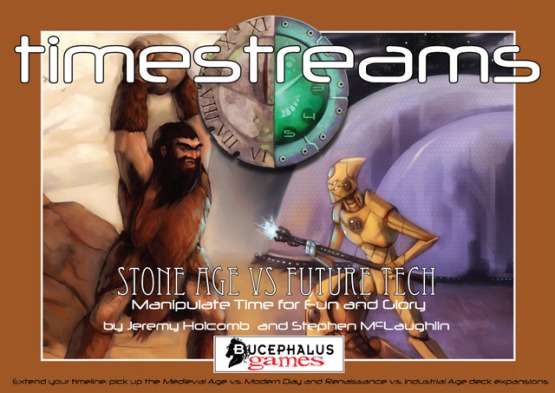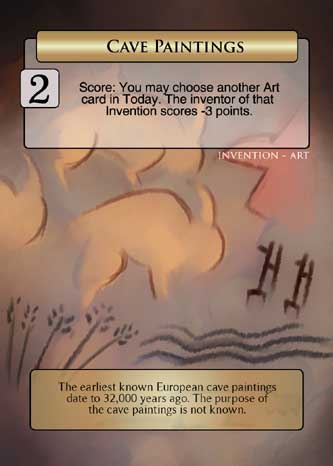Timestreams: Stella! Another one of these damn kids jumped in front of my car! Come on out here and help me take him in the house!

- Those cavemen are in for an uphill battle…
[A bad review. Not me. My review of the game is acceptable. This review, so far, is my only negative review I’ve given for a game.
I don’t like giving bad reviews. This might seem like I’ve given in to the man, and that I hope to gain favor with game companies, but that’s rather far from the truth. Maybe all this writing might put me inside a game company someday, but, as far as I’m concerned, the board game industry is looking for critical people who can find fault with their games before they publish them and the general audience finds fault with them.
The real reason why I avoid doing bad reviews is because I have the luxury of doing good reviews. The Myriad Games Podcast has me playing one or two new games a week. I’ve written reviews on less than 1% of the games I’ve played within the past two years. Why would I even bother to focus on a game I didn’t enjoy? Why not point people to games that I was amused by, or thought did something unique, or maybe critique a very good game for a shortcoming that upsets me?
So why did I write this article? Well, for one thing, I wanted a bit of street cred. If I read an series of articles by an author, and they are all positive, then I start to question that author’s judgement skills. If people read my reviews and come across this one, I want them to be able to say: “Oh! He didn’t like this game! It’s good to see he is a critical human being.”
The other reason? Timestreams is very frustrating. I probably repeated that word a few more times in this article. It aims to be a very cool game. There’s nifty stuff hapening here… but the play experience is too much like work. I’d go into this in more detail, but at this point, I’m infringing on my own article.]
This review was originally posted at Guilt-Free-Games.com.
On Tuesday night, the Myriad Games Podcast crew get together to play, talk about and review games. In order to expedite the learning curve for our games, we bring one home to read the rules and prep the game. After all, if we spend most of our time learning the game of the night, our review will be about learning the game, not playing it.
It is with this philosophy that I was sent home with a copy of Timestreams by Bucephalus Games. On first glance, it’s a neat idea. Time Travellers from different ages are all in conflict with each other, trying to alter the timestream to their advantage. Each game box features two decks: Stone Age vs. Future Tech, Medieval vs. Modern Day and Renaissance vs. Industrial Age.
After going through the cards and the rules, though, something didn’t feel right. A week later, when the players got together, I suggested that we put Timestreams back on the shelf and move on. We can’t review all the games that come out during the year, and we try to avoid reviewing games that the group doesn’t like.
Last Tuesday, though, Hoju, Jeff and Sarah all went home early, leaving Dan and I to figure out what to play. While I recommended we skip this game earlier, I’m more than happy to be proven wrong, so we took a risk on Timestreams and played the Stone Age vs. Future Tech expansion because it seemed like the goofiest match up of the three.
I could moan and gripe about a lot of aspects of this game, but if you want to hear someone complain about the shortcomings of your life, then pull out your cell phone and call your mother. Most of the game is fine: The artwork, game design and interactivity aren’t ‘inspired’, but they aren’t bad either. What’s wrong about Timestreams is not the end product, but the path it uses to get there.
In Timestreams, players go through six ages (from The Stone Age, to The Future) playing inventions and performing actions. In a two-player game, each player draws six cards for each era (!) and takes turns either playing cards or passing in order to go to the next era. Inventions are what score points in this game, but only the first six inventions in the era count. A very large quantity of the cards in this game are dedicated to moving inventions around, with the intent of getting your inventions counted, and sending your opponent’s inventions into obscurity. At the end of the game, time is unfrozen, and we score points in card order for each era.
In principle, the game sounds fun, except… well, it doesn’t make much sense. Inventions are flavored for that particular time period their Time Lord comes from, but are too abstract to build a story around. I’m a Stone Age timetraveller. Why did I just invent cloth, and what does that have to do with the next invention being worth -2 points. I invent the wheel, and it rolls two spaces up the track, which is cool, but what does this have to do with a cosmic time battle?
While playing, it was obvious that the two decks were not primed machines. The Stone Age deck is bursting with counter cards. Herbalism and Big Rock can stop your opponent’s fancy scientific contraptions, which is funny in principle… but this is a card game, not a farce. If I keep countering my opponent’s cards, he’s going to wonder why he’s bothering to play. If my opponent has a card in his hand that says he gains points for each artwork in play, and the only artwork I control is ‘Cave Painting’, a card that decreases the value of another art card, what’s the point? Players play games assuming that the game designers are on their side. Dan held all his artwork, waiting for me to play a friendly piece of art, and each round that it did not happen was a stab of frustration.

Run! Giant Rabbits!
Further alienating the players, is the score ability on a large number of inventions. These abilities go off when the card is being scored in the timeline. The idea is fine, but close to 50% of the inventions have a score ability. Six cards per turn + most of your abilities going off at the end of the game in a complex bejumble = fun only for those intelligent enough to become a Time Master themselves. And if you’re a Time Master, why are you playing this game? Are you waiting for the next Nexus to appear so you can leave the early 21st Century? Okay, that’s cool.
All of this isn’t bad, it’s frustrating. The concept, and presentation of the game is a homerun slugger. But the slugger was walked to first base – what a bummer. I’d be willing to play it again if someone busted out a copy, but I can’t recommend buying it when games like Roll Through the Ages exist.



















